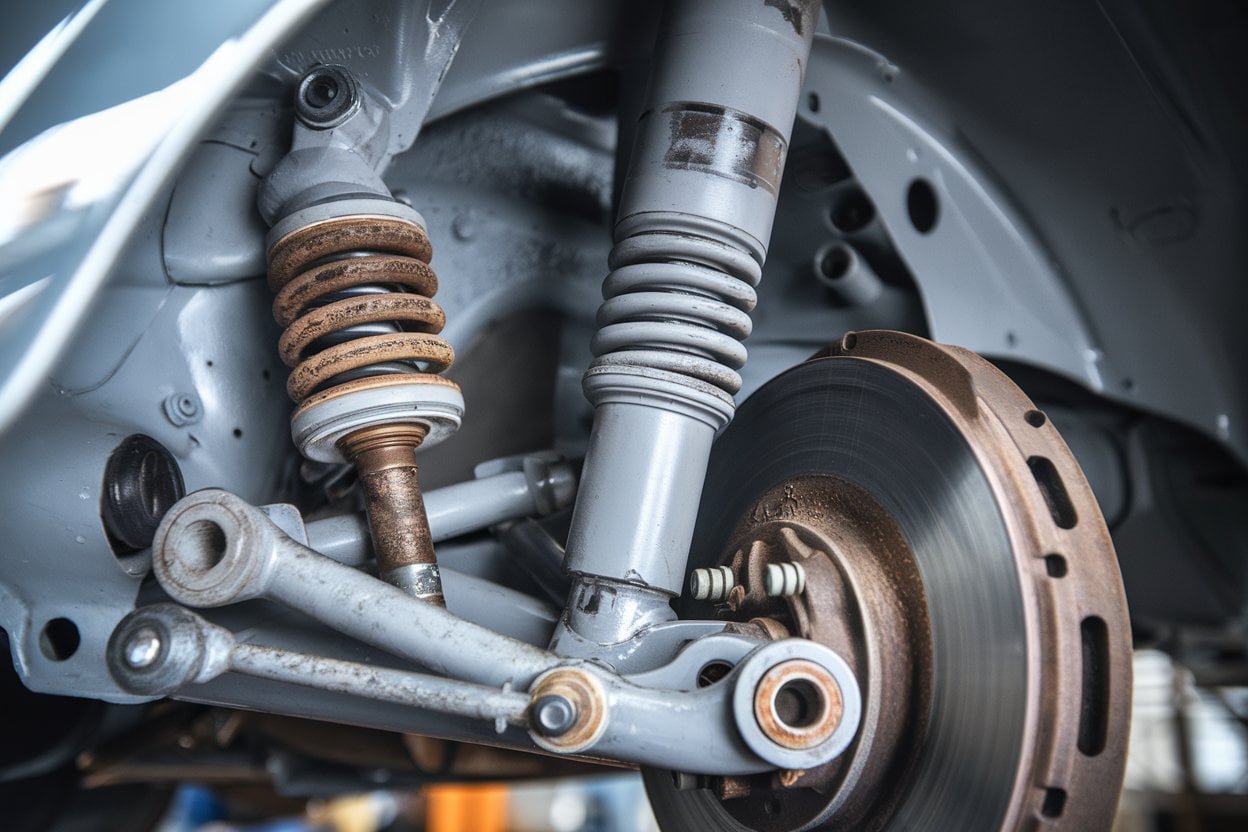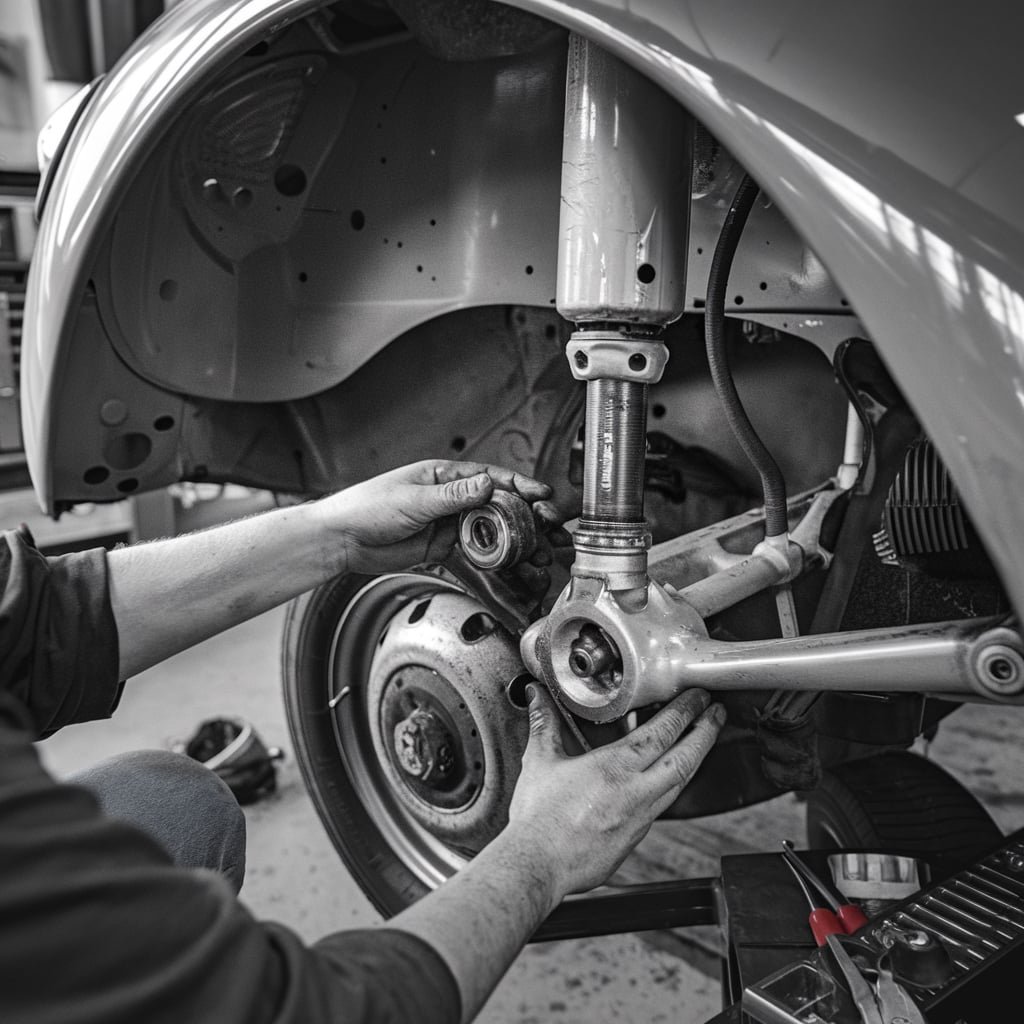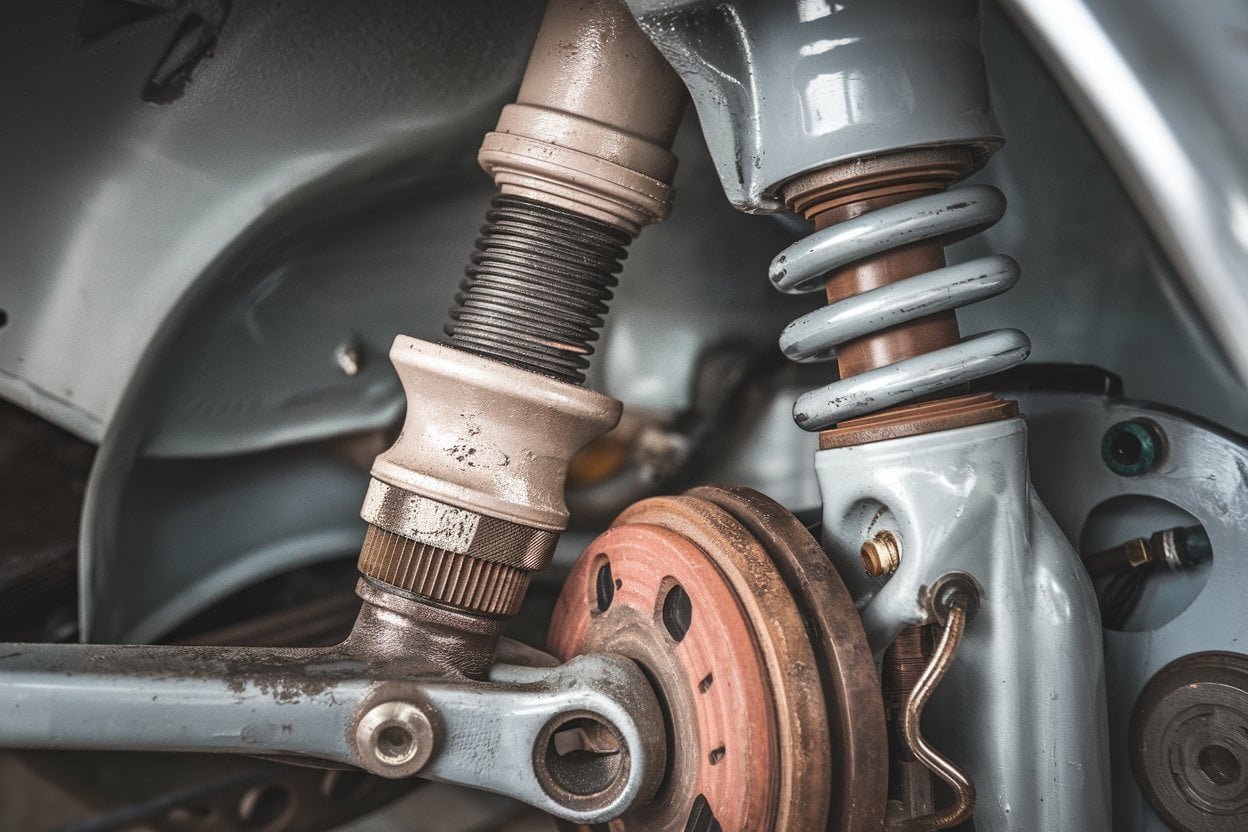Ever hit a bump and felt your steering go wobbly? Or maybe there’s this clunking noise that’s getting louder every time you turn? That’s not just a minor issue—it’s your VW Beetle warning you that something’s seriously wrong. A bad VW Beetle ball joint doesn’t just make your ride uncomfortable, it can snap mid-drive, causing a suspension collapse. And if that happens? Your wheel could detach.
Sounds extreme? It happens more than you think.
That’s where we come in. Our VW specialists in Dubai don’t just replace VW Beetle ball joints, we restore your car’s stability, safety, and smooth handling using original VW-approved parts (not just some random OEM brand). We know Dubai’s roads can be rough, you need parts that last.

Your VW Beetle’s ball joints are the backbone of its suspension—tiny but powerful components that connect your control arms to the wheel hubs. Think of them as your car’s ankles—if they fail, everything collapses.
Worn-out VW Beetle ball joints don’t just cause a rough ride; they throw off your steering alignment, make your tires wear unevenly, and if ignored, can snap completely, leaving your wheel flopping around like it’s got a mind of its own. And in Dubai’s fast-moving traffic, that’s the last thing you want.
Whether it’s steering that feels off, a strange clunking noise, or excessive vibration, don’t wait until it’s too late. A failing VW Beetle ball joint can lead to total suspension failure—fix it before it costs you more than just a repair.
Your VW Beetle won’t just break down suddenly—it’ll drop subtle hints before things go south. If you notice any of these red flags, don’t ignore them. A failing ball joint can lead to catastrophic suspension failure if left unchecked.
Hearing weird knocking or popping sounds when turning or going over bumps? That’s your ball joint crying for help—the metal components inside are worn out and rattling.
One side of your tire looks bald while the other side is fine? Bad ball joints cause alignment issues, leading to excessive wear on one side of the tire. If ignored, you’ll be replacing tires AND suspension parts soon.
When you turn the steering wheel, does it feel like there’s a delay before the car responds? That’s a classic loose VW Beetle ball joint problem, making your Beetle unstable at high speeds.
Are your hands shaking on the steering wheel even on smooth roads? Worn ball joints create suspension instability, causing the car to vibrate unnaturally—especially at highway speeds.
Finding it hard to turn the wheel, like you’re fighting against the car? That’s a binding ball joint, which means it’s close to seizing up completely.
If your mechanic sees torn rubber boots, leaks, or excessive movement in the joint, it’s game over. A VW Beetle ball joint that’s leaking grease or loose is one pothole away from total failure.
Jack up your Beetle’s front wheel, grip it at 12 and 6 o’clock, and shake it. Feel excessive movement? That’s a loose ball joint, and it’s a sign that replacement is overdue.
Check your front tires. If one side looks bald while the other side is fine, bad ball joints are likely throwing off your alignment. This can destroy your tires fast if left unchecked.
Ball joints are sealed with protective rubber boots filled with grease. If you spot leakage or torn boots, the joint will soon dry out and fail—causing serious steering and suspension issues.
Drive slowly and turn the wheel left and right. If you hear clunking, knocking, or popping noises, your ball joint is likely loose and rattling. The worse the sound, the closer it is to failing completely.
The workhorse of your suspension.
Less stress, but still important.
If one’s failing, the other isn’t far behind.
Ball joint replacement isn’t just about getting a new part—it’s about restoring safety, handling, and suspension performance. The price depends on whether you need a standard, OEM, or performance-grade ball joint. Here’s what to expect:
|
Ball Joint Type |
Price Range (AED) |
Features |
|
Standard Ball Joint |
300 – 600 |
Fixed design for older Beetles, budget-friendly |
|
OEM Volkswagen Ball Joint |
600 – 1,200 |
Genuine VW part, perfect factory fit |
|
Adjustable Ball Joint |
800 – 1,500 |
Fine-tunes wheel alignment, ideal for modified suspension |
|
Heavy-Duty Ball Joint |
1,200 – 2,000 |
Built for high durability, resists wear on rough Dubai roads |

🔹 Model Year – Older VW Beetles may have simpler ball joints, while newer ones require precision-engineered parts.
🔹 Labor & Installation Complexity – Press-fit ball joints require special tools and extra labor, increasing costs.
🔹 OEM vs. Aftermarket – Genuine VW ball joints are pricier but last longer and perform better than most aftermarket options.
🔹 Wheel Alignment – After replacement, an alignment is strongly recommended to prevent uneven tire wear.
Waiting too long? A failing ball joint can damage control arms and tires, leading to even higher repair costs. Fix it early and save money!
Need a quote? Contact us today for a free inspection!
Absolutely! Replacing a ball joint isn’t just a swap—it alters your VW Beetle’s suspension geometry. Without a proper wheel alignment, you could end up with uneven tire wear, poor handling, and a car that pulls to one side.
✅ Prevents Uneven Tire Wear – Misalignment can cause one side of the tire to wear out faster, forcing you to replace tires sooner.
✅ Restores Correct Steering Response – If your Beetle feels unstable or pulls to one side, alignment correction fixes it.
✅ Ensures Maximum Suspension Lifespan – Misaligned wheels put extra stress on suspension components, leading to premature wear.
✅ Improves Fuel Efficiency – Proper alignment reduces rolling resistance, helping your engine run more efficiently.
Skipping alignment after VW Beetle ball joint replacement? You could end up back in the workshop sooner than you think.
We offer precision wheel alignment with every ball joint replacement—ask our experts today!


Nothing lasts forever—especially suspension parts that take a beating every time you hit a pothole or speed bump. VW Beetle Ball joints are no exception. How long they last depends on how and where you drive.
|
Driving Condition |
Expected Lifespan |
|
Normal City Driving |
100,000 – 150,000 km |
|
Frequent Off-Road/Bad Roads |
50,000 – 80,000 km |
|
Performance / Aggressive Driving |
30,000 – 60,000 km |
A quick check-up can catch early wear before it becomes a costly repair.
Dubai’s roads can be unforgiving—slamming into bumps at high speeds shortens ball joint life.
Some ball joints require greasing to prevent friction damage. If yours are serviceable, make sure they’re lubricated during every oil change.
A worn-out ball joint won’t just break—it’ll wreck your control arms, tie rods, and tires, turning a simple repair into a major suspension overhaul.
If your Beetle’s ball joints have crossed 80,000 km, start watching for warning signs. Beyond 100,000 km? Get them inspected ASAP—because a failed ball joint doesn’t just ruin your ride, it can put you in serious danger.
When replacing your VW Beetle’s ball joints, the choice comes down to OEM (Original Equipment Manufacturer) parts or aftermarket alternatives. One guarantees perfect fit and durability, while the other offers a range of quality at different price points. So, which one makes more sense for your car?
OEM ball joints are designed specifically for Volkswagen vehicles. They fit perfectly, require no modifications, and maintain the exact suspension feel your car had when it left the factory.
They may cost more upfront, but they last longer, protect your suspension, and reduce future repair costs.
Aftermarket ball joints come in many different quality levels. Some are well-made and comparable to OEM, while others wear out quickly and lead to costly issues.
If you go with aftermarket, it’s important to choose a trusted brand. A cheap ball joint might save money now, but if it fails early, it could end up costing more in repairs.

VW Beetle Ball joints wear out over time, but proper maintenance can make them last longer. Follow these simple steps to avoid premature failure and costly repairs.
When it comes to suspension repairs, you don’t want to take chances. A poorly installed ball joint can lead to steering instability, uneven tire wear, and even suspension failure. That’s why VW owners in Dubai choose us for precise, high-quality ball joint replacements.
Our technicians are VW specialists trained in suspension diagnostics and repairs. We know the exact specifications of your Beetle’s suspension, ensuring flawless installation every time.
Need your ball joints replaced fast? We offer same-day repairs to get you back on the road without unnecessary delays. No waiting, no hassle—just efficient, expert service.
We use only original Volkswagen ball joints or high-quality OEM replacements. No low-quality aftermarket parts that compromise safety or performance—just factory-grade durability.
No hidden fees, no surprises. We provide honest, upfront pricing so you know exactly what you’re paying for. Top-quality service at a fair price.
"Fast and professional service! My Beetle’s suspension was making terrible noises, and they fixed it the same day. The car feels brand new!"

Book a Call Back Now
If your Beetle’s steering feels off, you hear clunking noises, or notice uneven tire wear, don’t wait until the damage gets worse. A quick inspection and replacement can save you from bigger repairs and unnecessary risks.
We specialize in precise, high-quality ball joint replacements, using genuine VW-approved parts for a perfect fit and long-lasting performance. Our Volkswagen-certified mechanics will restore your car’s stability, comfort, and safety—all at fair, transparent prices.
“Talk to a Volkswagen Expert Now by booking a call, and get personalised solutions for your Volkswagen unique needs and requirements.”
+971564646081
